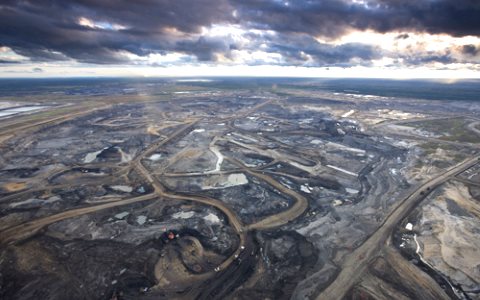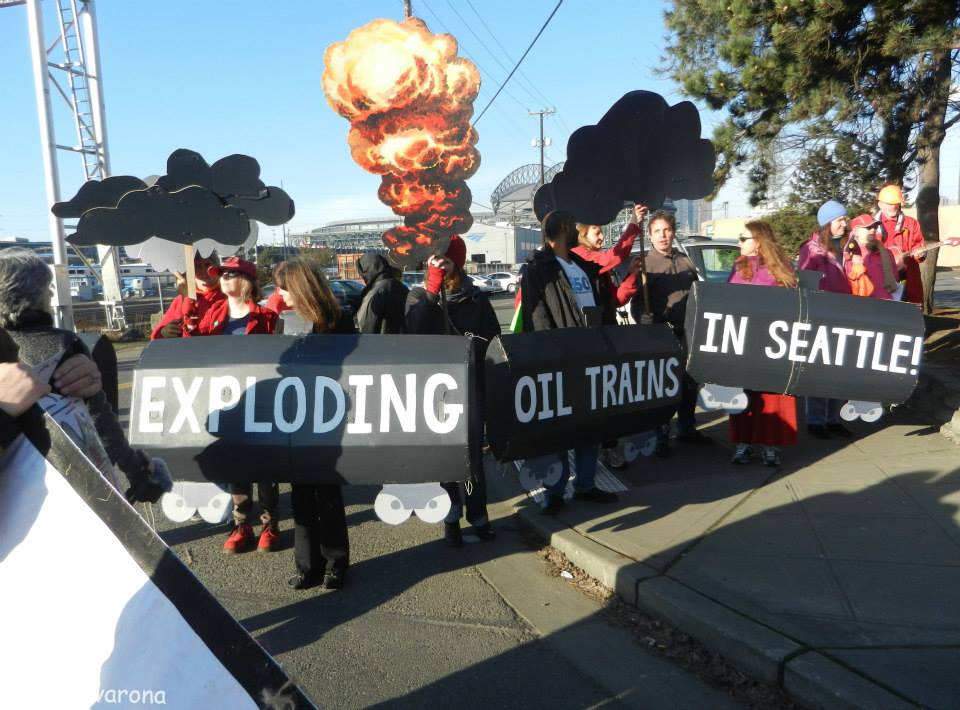Trains carrying oil raise tough questions in Pacific Northwest
As crude oil rail shipments increase, residents fear derailments and explosions.
Nov 24, 2014 High Country News....Bakken oil is a “light sweet” crude with a flashpoint close to that of gasoline. Its dangers made headlines in July 2013, when a train derailed and exploded in the small town of Lac-Mégantic, Quebec, killing 47 people and devastating much of the town. Lac-Mégantic became the symbol of the dangers of transporting oil by train, but it has not been the only serious accident. According to the Associated Press, at least 10 oil trains have derailed in the U.S. and Canada since 2008 — five in the last 18 months. One in Lynchburg, Virginia, triggered a huge fire and spilled tens of thousands of gallons of oil into the James River.
Lawmakers and regulators have proposed new rules to make oil trains safer and to provide more information to first responders about their contents and routes. But the recent accidents have intensified long-simmering anxiety across the Northwest over proposed export terminals slated to send vast quantities of coal, natural gas and oil overseas. While energy companies see rail as an integral part of oil transport’s future in the Northwest, environmentalists see oil trains as incompatible with the region’s efforts to curb its carbon emissions and reduce fossil fuel dependency. ...
... Last December, BP’s Cherry Point refinery, east of Bellingham, began receiving 70,000 barrels of Bakken oil per day through its new oil-by-rail facility.
The refinery, 90 miles north of Seattle, sits beside the proposed location of the controversial Gateway Pacific coal terminal, which, if built, could ship 54 million metric tons of coal overseas annually. Such a project, says de Place, would swamp the state’s nascent effort to cut carbon emissions. ...
“This is provoking a sort of existential crisis,” says de Place. “(The) region has historically been very green-minded and has prided itself on leadership in climate policy. And it’s now poised to become a carbon-export hub of global significance.” {subscription site: read more here}
Falling oil prices: what impact on North American crude by rail?
In Benicia, some are wondering about implications for and against Valero’s crude-by-rail proposal
By Roger Straw, November 29, 2014 The Benicia Independent The business news pages of mainline media are repeatedly trumpeting the dramatic decline in the price of oil. Regular folks here are happy to see gas prices at the pump at or below $3/gallon. Business Insider reports that “The decline in the price of oil has been fast and furious, with oil prices falling more than 30% since June.” This has been near disastrous for some petroleum producers. (See links below for details.)New Eastern Outlook author William Engdahl offered a broad global political perspective on November 3. According to Engdahl, “The collapse in US oil prices since September may very soon collapse the US shale oil bubble and tear away the illusion that the United States will surpass Saudi Arabia and Russia as the world’s largest oil producer. That illusion, fostered by faked resource estimates issued by the US Department of Energy, has been a lynchpin of Obama geopolitical strategy.”
Engdahl continues, “The end of the shale oil bubble would deal a devastating blow to the US oil geopolitics. Today an estimated 55% of US oil production and all the production increase of the past several years comes from fracking for shale oil. With financing cut off because of economic risk amid falling oil prices, shale oil drillers will be forced to halt new drilling that is needed merely to maintain a steady oil output.” ..... read more here

The Syncrude Aurora Oil Sands Mine, north of Fort McMurray, Canada. Photo: Elias Schewel via Flickr.
Tar sands industry faces 'existential' $246 billion loss
Gregory McGann Ecologist 11/27/14
The report suggests that that investors are being misled about the economic viability of oil sands production, which is doing irreparable damage to the pristine boreal forests of northwestern Canada.
CTI, an environmentally-aware financial analysis company, argues that future oil sands projects, besides being environmentally disastrous, are also financially catastrophic and are leading their investors towards serious loss....
... CTI calculate that 92% of future oil sands production will only viable if oil prices are $95 per barrel. However, prices stand at only $85, so producers are losing money for every barrel of oil they sell - unless they are cushioned by existing higher-priced contracts, which will sooner or later expire.
The recent decline has thus "changed the whole dynamic for regions of marginal production - most noticeably the oil sands of Alberta" - and investors are facing significant losses unless oil prices pick up rapidly.... read more here







